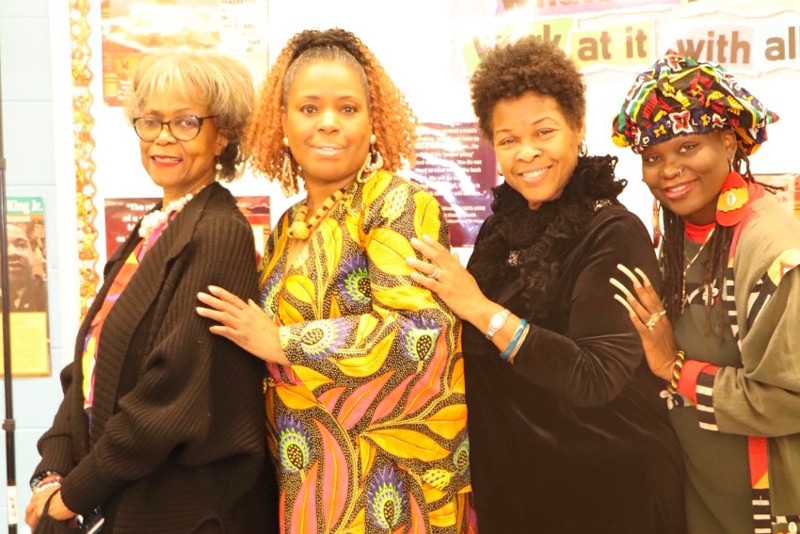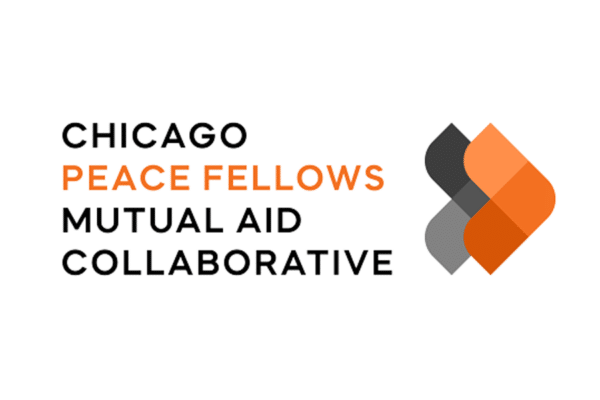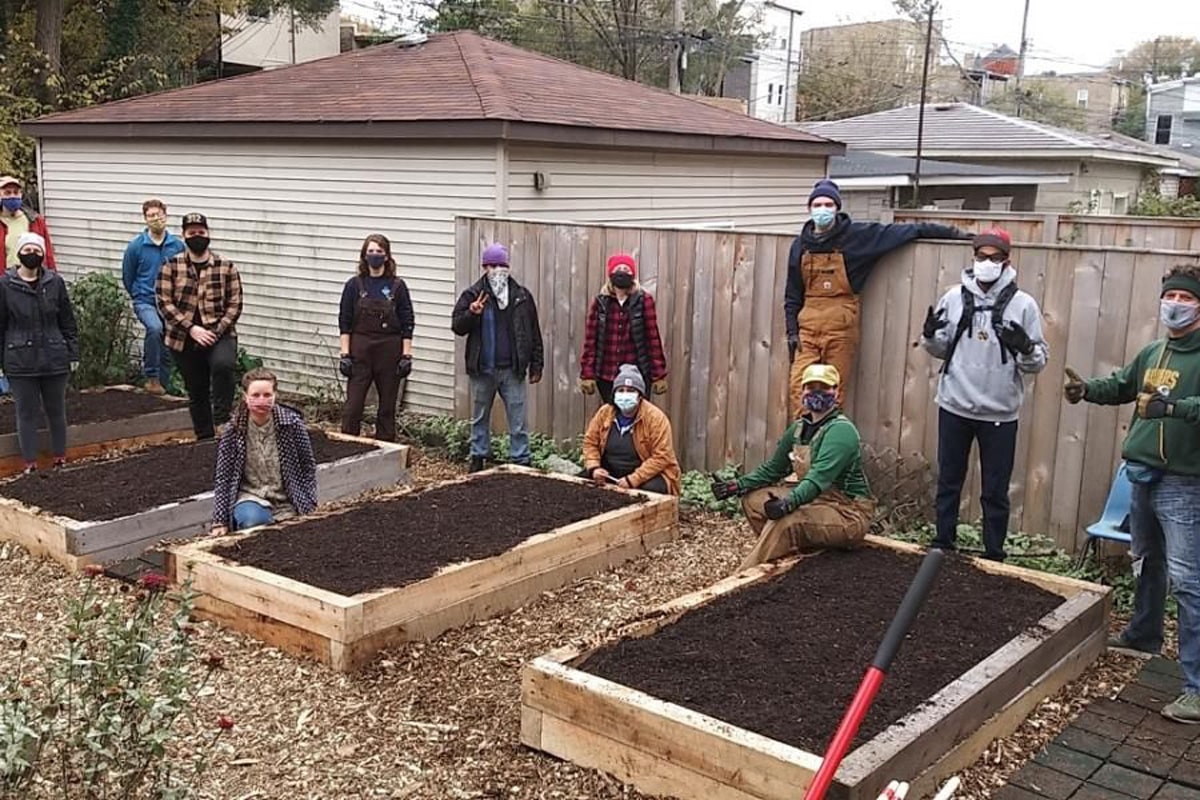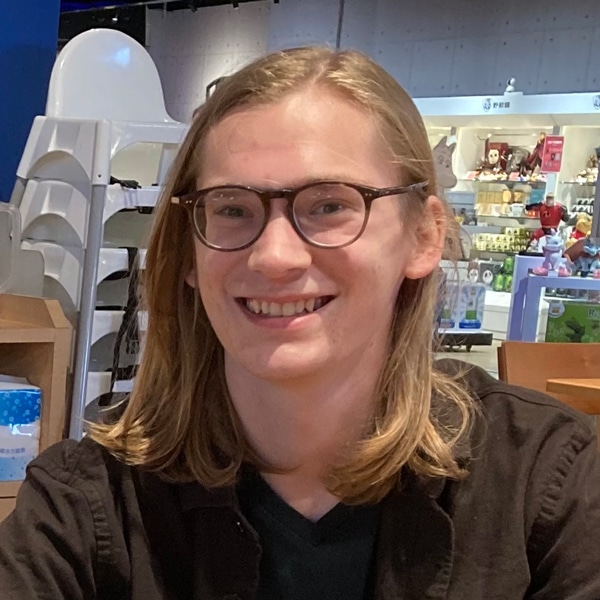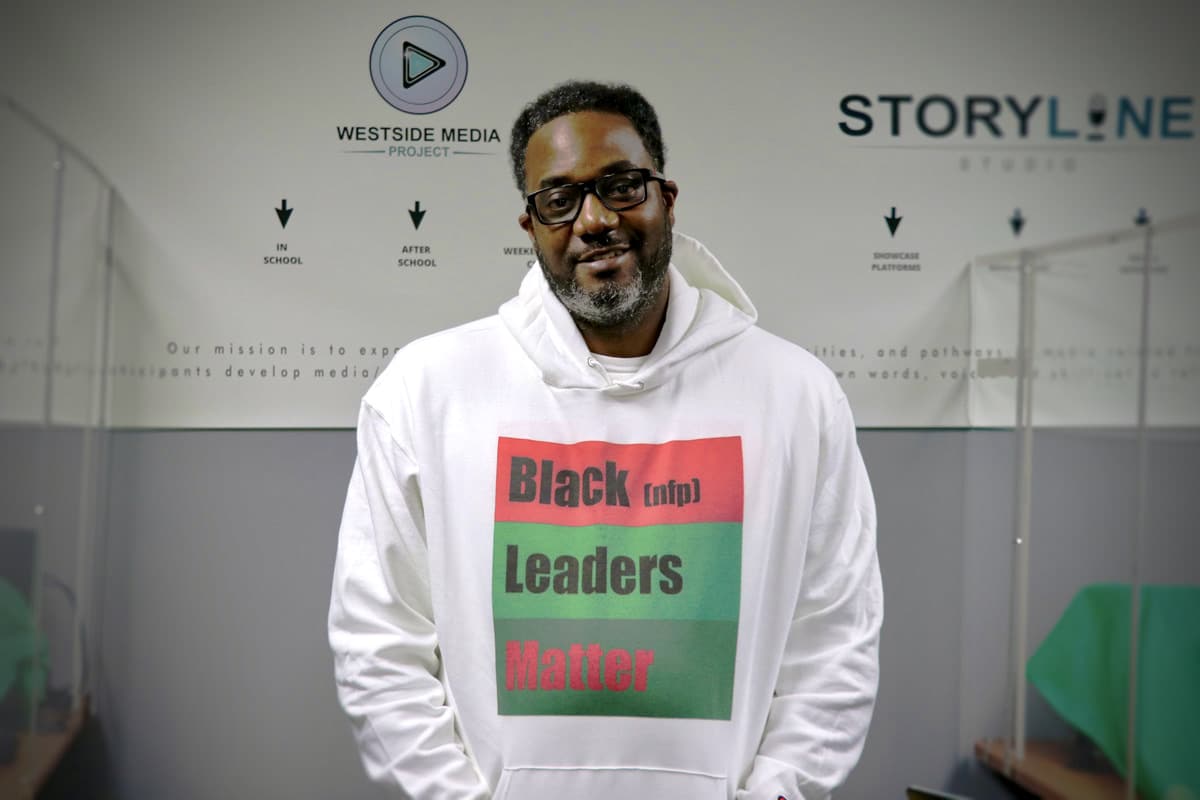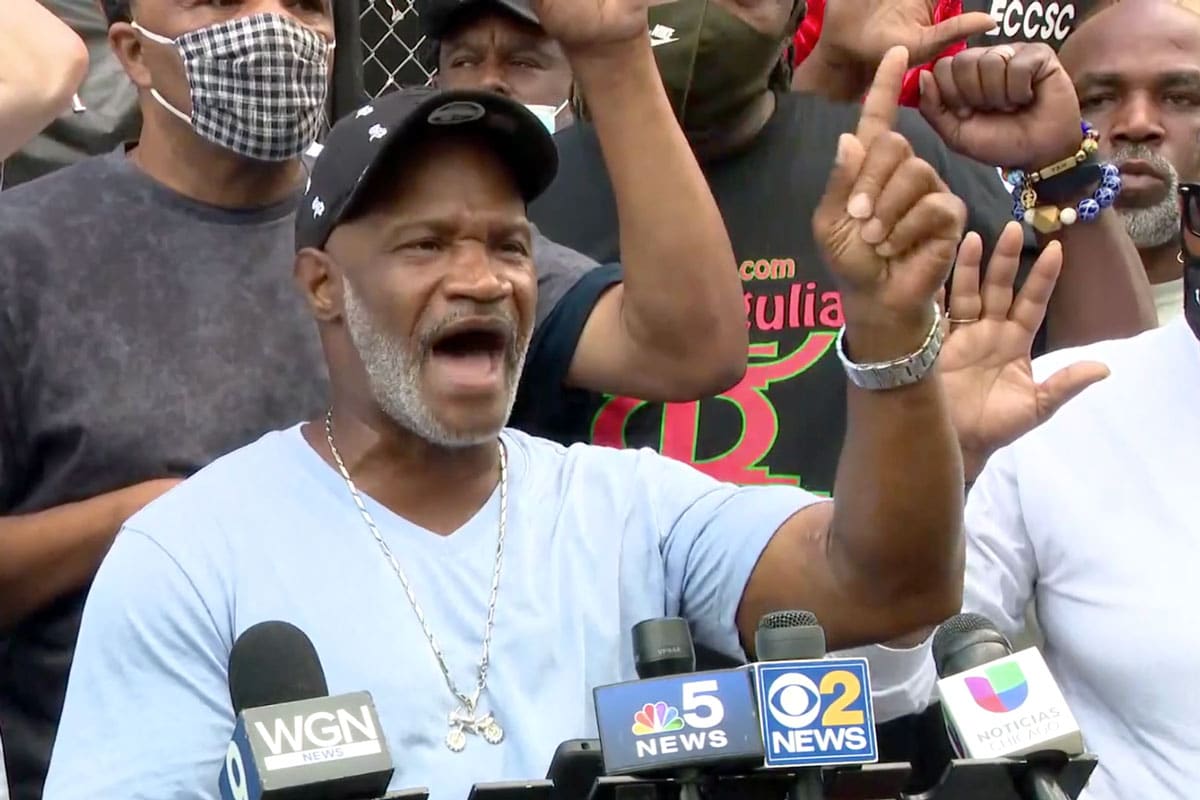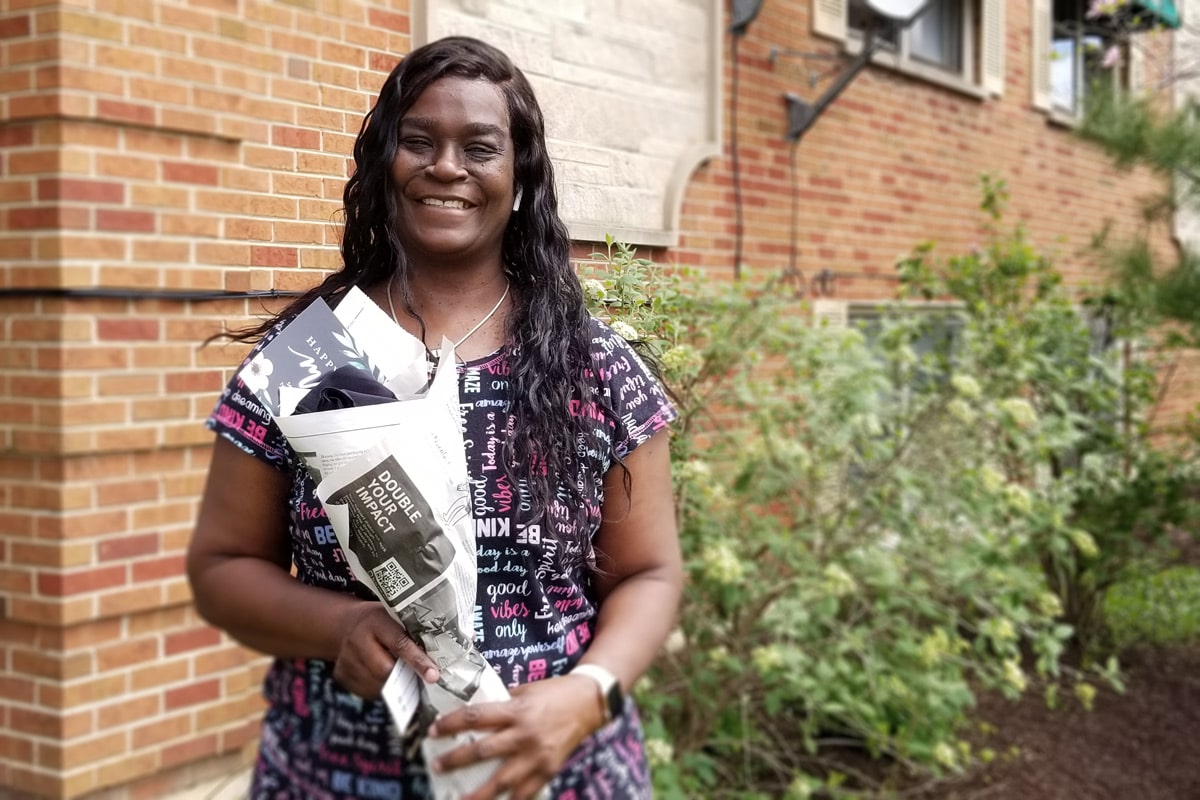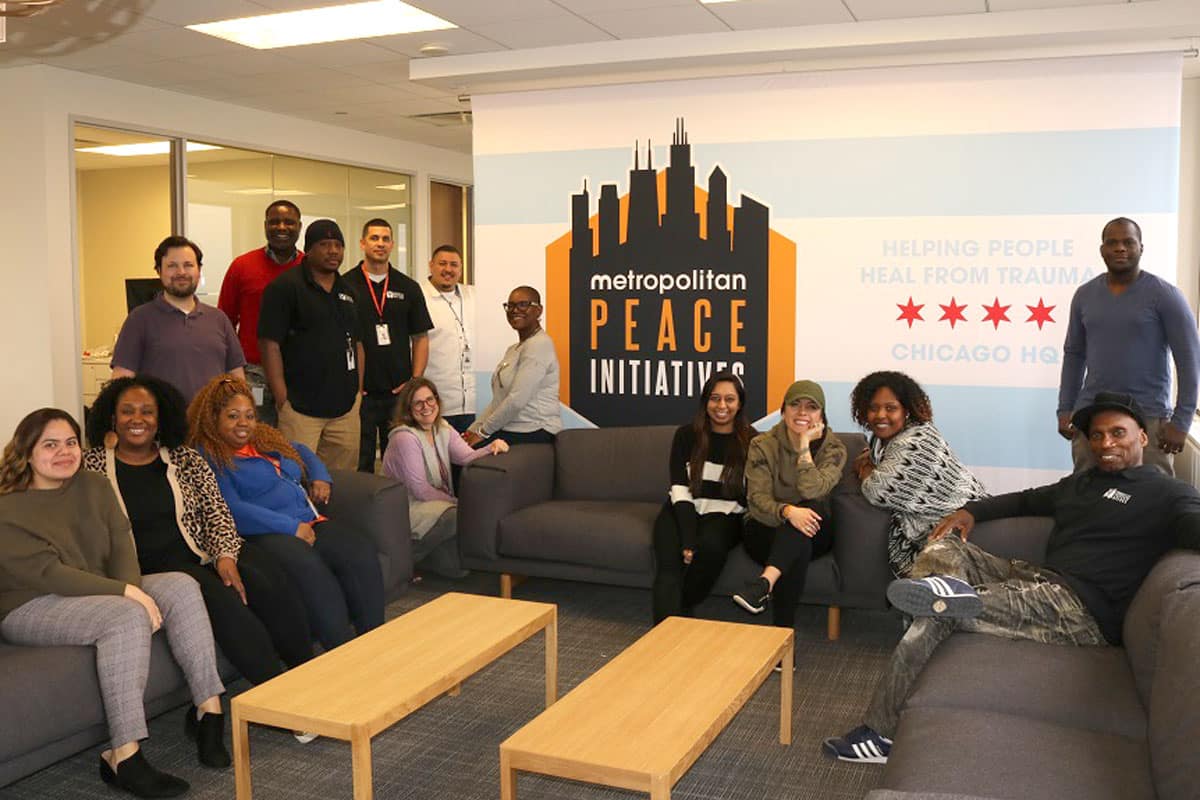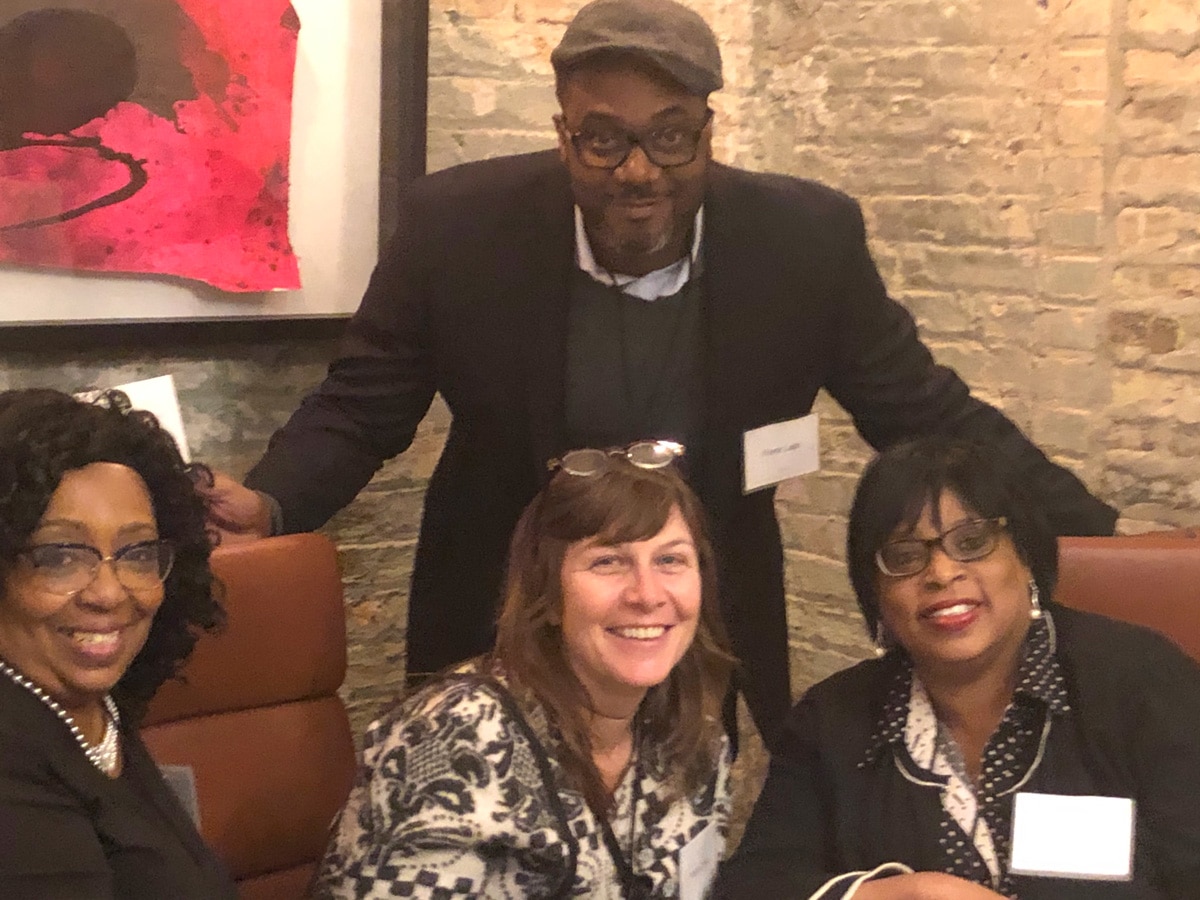Principles of Kwanzaa Can Unite Us
By Cree Noble, Team Coordinator
Last December 2021 Chicago Peace Fellow Pastor Victoria Brady and members of Big Mama Movement Chicago (a coalition which she co-founded) hosted The Black Family Reunion on the last 3 days of Kwanzaa. Big Mama Movement Chicago is a group of Black women who are calling for the unification of the Black Family. Pastor Victoria conceived the idea of hosting a global Black Family Reunion and thought, what better time to call for unity than during Kwanzaa.

Pastor Victoria (nicknamed Pastor V.) and six other Big Mamas embarked in the planning of the celebration, realizing that the principles of Kwanzaa can be used as a powerful instrument to bring Africans and the African Diaspora together. Also realizing that people right here in the United States do not understand Kwanzaa, Pastor V. states:
"There are so many misconceptions about Kwanzaa including that it is designed to replace Christmas. This is not true. Kwanzaa is a week-long celebration of the best of Blackness; it is a cultural celebration that uplifts families and the community.” - Pastor Victoria Brady
Pastor V. is continuing the work of creating safe spaces for civic and community engagement, making peace, and bringing a greater degree of peace and unity within the Black community. With the goal of building unity in mind, she plans to conduct a series of highly engaging and innovative teach-ins/workshops to share the importance of the Nguzo Saba which are the pillars upon which the principles of Kwanzaa are built. She is preparing to share this information with leaders in the U.S.A. and in different parts of Africa who can, then share the information within their communities. Pastor Victoria’s efforts are expanding to include Peace Fellows in Chicago and across the globe. The Nguzo Saba, which are shared here, has the potential to spark lasting changes in the way that Africans and the Diaspora view itself and our sometimes fragmented relationships stemming from chatel slavery where families and communities were ripped apart.

According to the National Museum of African American History and Culture, Kwanzaa is a time of learning, family, and celebration...families and communities come together to share a feast, to honor the ancestors, affirm the bonds between them, and to celebrate African and African American culture. Each day they light a candle to highlight the principle of that day and to breathe meaning into the principles with various activities, such as reciting the sayings or writings of great Black thinkers and writers, reciting original poetry, African drumming, and sharing a meal of African Diaspora-inspired foods.

The table is decorated with the essential symbols of Kwanzaa, such as the Kinara (Candle Holder), Mkeka (Mat), Muhindi (corn to represent the children), Mazao (fruit to represent the harvest), and Zawadi (gifts). One might also see the colors of the Pan-African flag, red (the struggle), black (the people), and green (the future), represented throughout the physical space and in the clothing worn by participants. These colors were first proclaimed to be the colors for all people of the African Diaspora by The Honorable Marcus Garvey. The seven principles of Kwanzaa to be put into daily practice are listed here:

“The teach-ins are designed to bring a greater awareness of Kwanzaa, demystify it, and to seek ways to improve the quality of life by incorporating the seven principles into the lives of Africans and her Diaspora rooted in Umoja (Unity) and Imani (Faith)” says Pastor V.
More information go to: https://nmaahc.si.edu/explore/stories/seven-principles-kwanzaa
Illuminating the Pathway to Racial Justice in Philanthropy
The Chicago Peace Fellows Mutual Aid Collaborative held a press conference on the anniversary of the assassination of Malcolm X to amplify the themes of their open letter, A Pathway to Anti-Racist Philanthropy. The Mutual Aid Collaborative members are all Alumni of the Chicago Peace Fellows program -- now 60 members strong across the South and West Sides -- who joined forces through the Collaborative as an ongoing platform for shared learning and collaboration.
During this interactive press conference, Collective members La'Keisha Gray-Sewell, David Gonzalez, Cosette Nazon-Wilburn, Victoria Brady, Gloria Smith and Annamaria Leon shared the core elements of the Funders Pledge, outlining critical steps that philanthropic leaders can take immediately to promote racial justice in funding.
Chicago Peace Fellows Mutual Aid Collaborative was born in 2020 to address the enduring legacy of racial injustice that has been laid bare by the disproportionate impact of the twin pandemics of violence and COVID-19 on our communities on the South and West sides of Chicago.
During the press conference, Fellows shared insights into how their Mutual Aid Collaborative can be an illustrative model for philanthropy to consider on their path to racial justice in funding. In particilar, the Collaborative uses a "pooled fund" approach where those closest to the issues make collective decisions, share their gifts and assets, and take collective action on priorities that are set by the communities they serve.
This powerful call for Racial Justice was echoed in an article in the Chicago Sun Times entitled Chicago philanthropies urged to sign pledge to ‘rectify racial inequity’ in their giving, featured in a news report on WBBM NewsRadio, and published as an op-ed in Crain's Chicago Business.
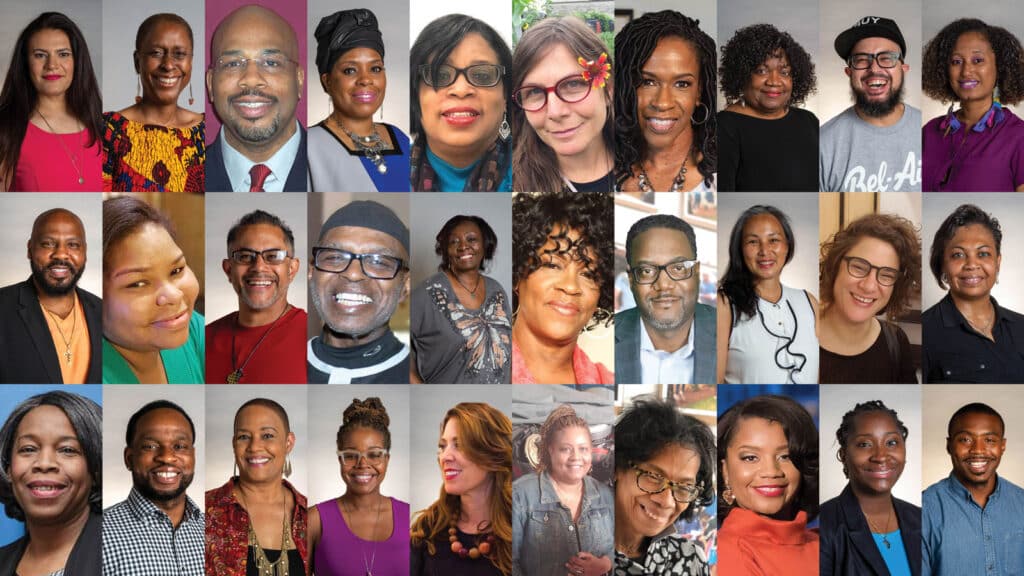
All Foundations, corporations, donors or aligned organizations that are willing to pledge to stand up for racial equity are invited to connect by completing this short form:
CONNECT WITH US
If you have questions or suggestions, please connect with us at funderspledge@goldininstitute.org or at (312) 951-1691.
United by STEM: One Team, Two Continents
featuring Dieudonne Allo and Jacquelyn Moore
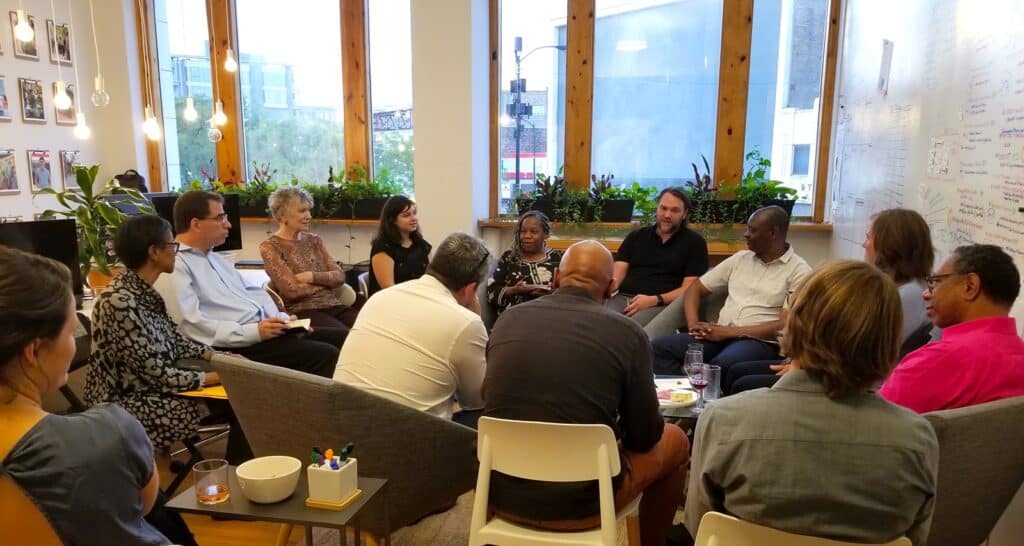
Two Goldin Fellows from South Africa and the USA (Dieudonne Allo and Jacquelyn Moore) are joining forces to convene young people with an interest in STEM and Robotics from Chicago (USA) and Port Alfred (South Africa) to collaborate as a unified team to compete in the FIRST® Innovation Challenge presented by Qualcomm.
Both seasoned professionals in teaching STEM through real world application in their respective countries, Dieudonne and Jacquelyn share a commitment to teaching robotics related skills to illustrate the value of engaging in a cross-continental collaboration with youth ages 13-19. For Inspiration and Recognition of Science and Technology (FIRST®) is a global community which seeks to empower and equip young people to become innovators in STEM, and foster life-long skills through inclusive team-based initiatives.
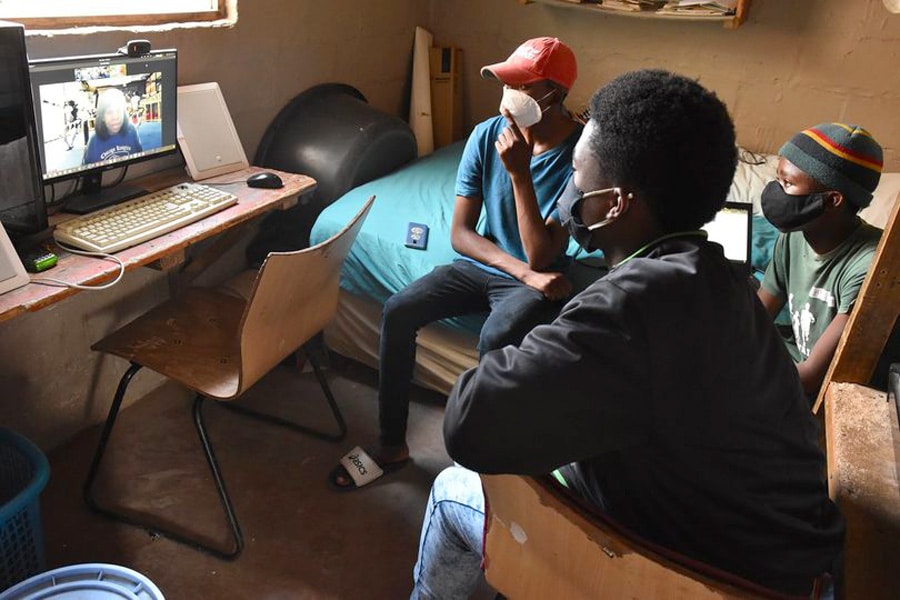
Allo is the CEO of the Global Leading Light Initiative, a non-profit in South Africa which supports young people in historically disadvantaged communities to acquire future proof skills, with the aim of reducing poverty and inequalities. Moore is the founder and Executive Director of Agape Werks, Inc, a community based non-profit in Chicago with a mission to promote in young people an appreciation of math, science, technology, and engineering as strategic tools for success regardless of life circumstances. In Agape Werks’ offerings, all skills will be learned and applied in an inclusive and collaborative environment that partners teens of various skill levels, interests, and heritage with caring and professional adults, all focused on the same goal.
Allo and Moore developed the “One Team Two Continents” concept in 2019 when they began exploring cross-continental collaboration opportunities after meeting through the Goldin Global Fellows program. This initiative envisions a youth-led, distributed team working together by using robotics related skills to meaningfully address common issues that impact their geographically dispersed communities.
The global pandemic led to FIRST® making their programs virtual, removing the need for participants to travel. One of these remote programs offered by FIRST® was the Global Innovation Challenge, a competition for teams to design a solution under the theme of ‘active play and movement’, for which youth from South Africa formally joined the Chicago Knights to compete in the 2020-21 FIRST® GAME CHANGERS℠ powered by Star Wars: Force for Change. In February of 2021, the youth began working together to submit a solution to the challenge:
“Identify a problem or opportunity to help people (or a community of people) keep, regain, or achieve optimum physical and/or mental health and fitness through active play or movement”.
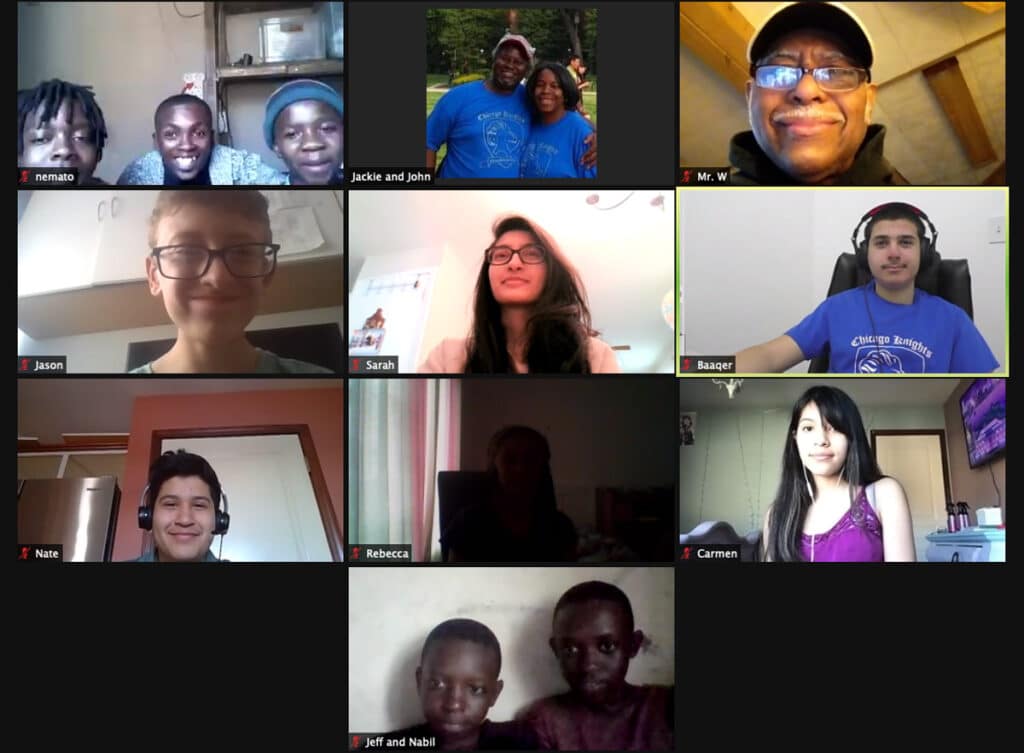
The team represents 2 continents, 3 countries, 8 unique primary languages, plus 5 unique languages team members are learning.
Each member has committed to meeting three days a week for at least 10 weeks, to learn from each other and to foster cross-cultural collaboration and sharing. Bringing together their combined knowledge, passions, insights, and interests, they have developed a solution based on cutting edge technology and empathy for their users. They are now focused on finalizing their business presentation and pitch. The team (the International Chicago Knights) will be pitching their solution to a panel of judges on April 3, 2021 and will share it with you here, soon after.
When asked why they joined the team, the youth responses ranged from “my mom wanted me to join, but now I really enjoy learning programming” (Rebecca, South Africa) to “I am interested in learning about and designing a robot” (Anathi, South Africa). Almost all of them are excited about learning to use the Python programming language. Team member Baaqer (USA) adds: “passion to discover new technologies and solve challenging problems in the purpose of helping people gives me the everyday encouragement to stay effectively committed to the challenge.”
Moore has led the mentoring and learning process during the 5 different sessions each week, with a diverse group of mentors and subject matter experts working with her. This includes team alumni, retired engineers, medical professionals, and business partners. Programming mentor, Sarah (graduate student, USA) volunteers because her “desire for constant learning is a significant motivation to be involved in this challenge. I want to learn, help, and work with others to solve problems!” The team members are learning a variety of business, technical, and interpersonal skills, and how to apply these skills to group problem solving. More importantly, the teens are learning new ways of communicating and gaining a deep understanding of creating universally accessible products.
“This extraordinary learning experience is not only imparting STEM-related skills, but it is also changing teens’ perceptions of themselves, others and life. At GLLI, one of the main challenges we have faced in our work with young people is their limited beliefs about themselves and others. ‘One Team Two continents’ is going beyond teaching them robotics and design skills to tackle this challenge in a significant way. The co-creation and excitement which I observe during sessions constantly raise the question, “How can we help more underserved teens to access this program?” —Goldin Global Fellow, Dieudonne Allo, South Africa.
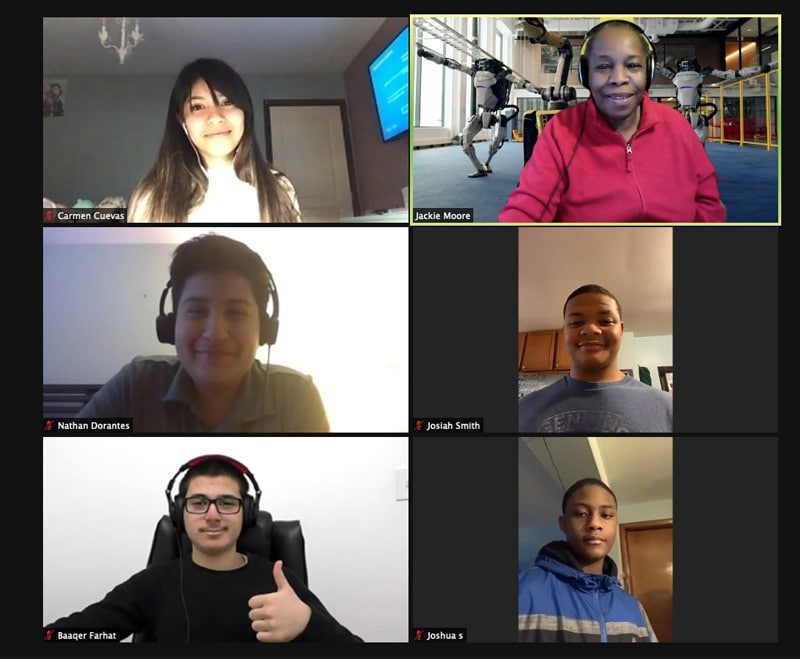
“This particular initiative is a concrete example of what we want to accomplish as partners. It’s an opportunity to test and prove that it can work. We are not chasing the trophy in this competition; we are chasing the goals, but if we get the trophy that’s icing on the cake.” — Chicago Peace Fellow, Jacquelyn Moore, USA.
To ensure the success of this initiative, the One Team Two Continents team needs your support.
Their process requires resources which most youth cannot afford and cannot access. The One Team Two Continents initiative would appreciate any help to obtain the following items. To make a contribution please visit the team’s PayPal page.
To support remote learning:
- Mobile hotspots (or home internet access)
- Internet capable computing devices (at least a smart phone or tablet)
- Webcams
- Microphones
- Headphones
Additionally, to support learning specific skills:
- Windows 10 computers with at least 8G RAM (for robotics specific software, also supports remote learning)
- three button USB mice (for 3D modeling and design)
- Electronics Project Kits
- Educational robot kits
To support bringing the product to market, cash, or in-kind donations of:
- Raw materials for fabrication (polycarbonate, acrylic, 3D filament)
- Graphics Artist (marketing purposes)
- Specific electronic components (sensors, micro controller, etc)
To Support travel when it is permissible, cash donations help pay for:
- Passport and Visa fees for students
- Travel Costs (local and abroad)
- Housing for students and mentors/chaperons
- Cultural experiences (local and abroad)
Generating food, beauty and safety for neighbors in Chicago
By Yusuph Masanja, Co-Facilitator, Global Alumni Network
Goldin Global Fellow from Chicago, Robin Cline, serves as Assistant Director of NeighborSpace, the only nonprofit land trust in Chicago that preserves and sustains gardens on behalf of dedicated community groups. NeighborSpace has helped neighbors and community groups protect over 120 outdoor sites, transforming them into places where people gather to play, to grow food together, and to organize around issues in their neighborhood.
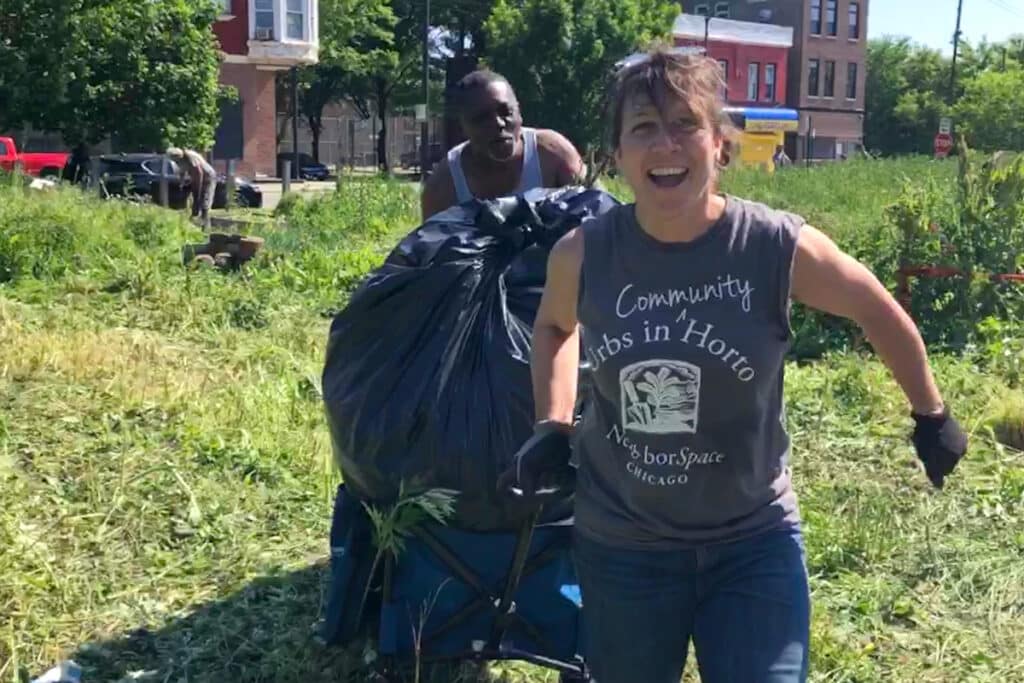
NeighborSpace continues to help community groups identify outdoor sites that can be turned into community garden spaces. They partner with early community organizations, early childhood teachers, seniors, and families in turning potential unused sites into gardens and creative gathering spaces. Especially now in the time of COVID, these outdoor spaces are more and more used as places for free haircuts, food distributions, COVID tests, and community meetings.
NeighborSpace continually works to support more growing and gathering space, and you can help with this New Year’s goal of adding 100 garden beds to NeighborSpace sites across Chicago, by visiting this Crowdfunding page to help NeighborSpace reach this goal before the 2021 growing season.
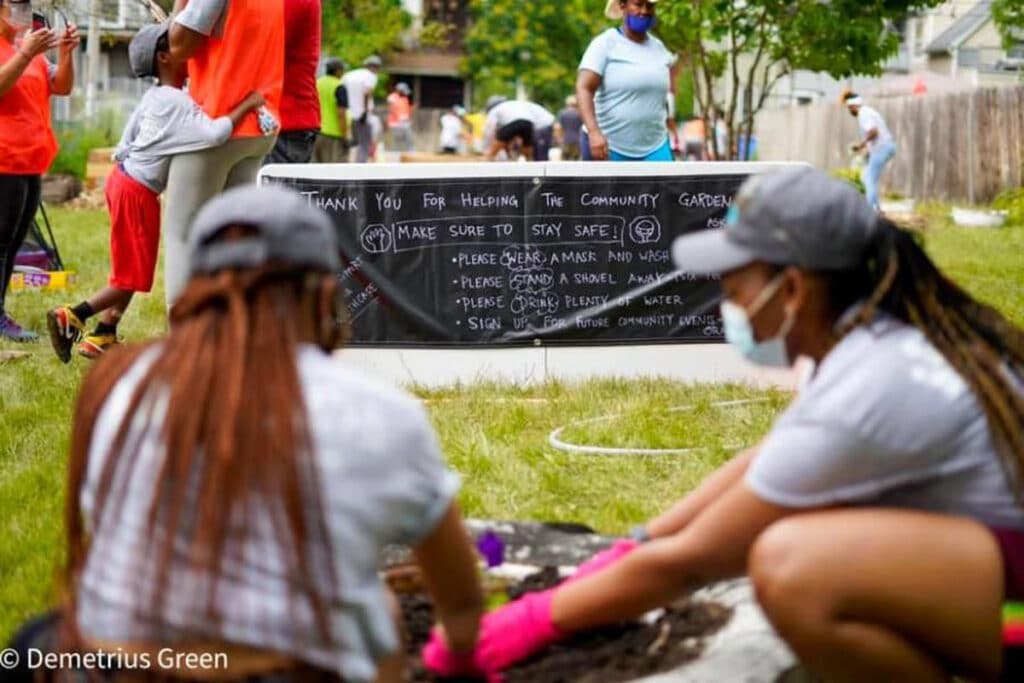
For Robin, the motivation to dive into this work comes from the goal to encourage urban people to reconnect with nature, themselves, and their community. Robin believes that if you set the right conditions for people to understand a series of processes, like that of a plant ––from seeds to fruits––it helps them understand the importance of how connected we are.
"How can we create opportunities for people to have physical connections to shared public spaces that then prompt them to have in-person connections with their neighbors?"
/Robin has recently graduated from the Visual Collaboration course which was offered by the Bigger Picture Academy. Having been inspired by this collaboration tool, she is considering applying it to support processes by which the garden leaders conduct their community building vision. Robin is mobilizing resources to provide these leaders with access to computers and the Mural application in order to learn and start using Visual Collaboration methods.
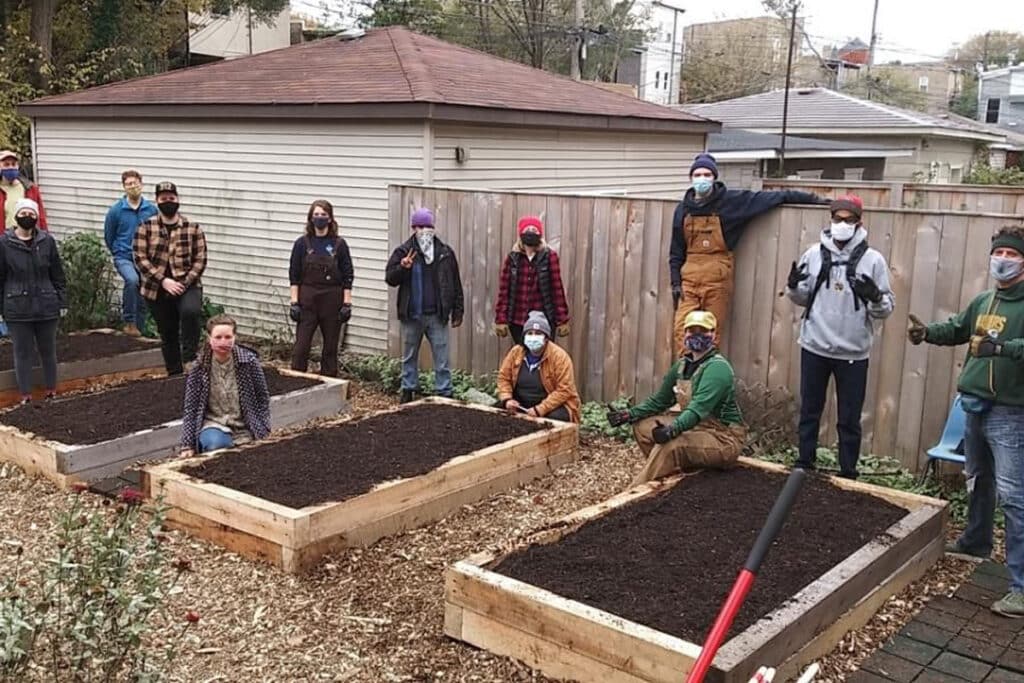
Furthermore, Robin finds inspiration from the stories of Goldin Global Fellows. The stories motivate her to keep up the good work despite challenges faced from time to time.
"Hearing other people’s stories of salvation and struggle fuels the work I am doing. We are doing non-profit work that sometimes feels invisible."
Robin adds: "The sharing of stories is so 're-storying' which is so restorative, I feel like that's an important part of the Goldin Global Fellows connection- to support each other in serving others."
Every One of Us is Better Than Any One of Us
By Yusuph Masanja, Co-Facilitator, Global Alumni Network
We want to teach young people how to be productive, we don’t just give them jobs! We ensure they can keep the jobs and grow to creating their own jobs
Raymond Richard, Goldin Global Fellow
Raymond emerged from struggles of homelessness, criminal activities and substance abuse to become a mentor, activist, and public speaker. He works tirelessly to decrease neighborhood violence and contribute to a safe environment for children and families across the United States. Driven by the urge to help young men and women become productive members of society, Raymond founded Brothers Standing Together (BST) in 2009, a year later after being released from his sixth incarceration.
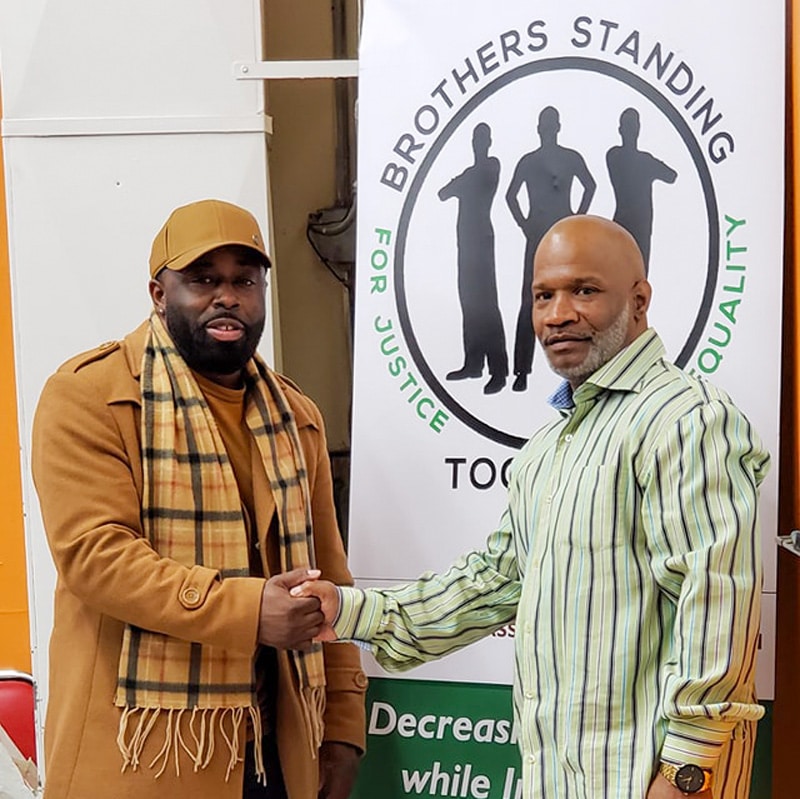
BST has empowered over 1,500 youth through different programs, including but not limited to, practical skills training such as carpentry, plumbing, welding, painting, bricklaying etc. Raymond provides lifelong traits that help youth find a purpose in life. BST programs also assist youth with obtaining Identity cards, birth certificates, license, housing, meals and employment.
“65% of young men in the city of Chicago don’t have IDs, every time they are stopped by police, they are labeled as John Does.” Raymond says.
BST is partnering with County jails to provide opportunity for community service work. At BST, Exemplary volunteers often get enlisted for available job opportunities. During the pandemic, it has become challenging for BST to reach youth, especially the homeless.
COVID has decimated our community outreach, I am often outside seeking job opportunities for our youth or speaking with youth because most of them are outside–you have to be grassroot to serve them better. It’s now difficult to reach out to those who are mostly likely to shoot or be shot, we try to keep communication open with caregivers and parents through emails.
With 15 staff, BST tries everything to reach more youth, but more help is needed. Ray shared, “With all the good help we provide, we don’t even have the help that we need, and that’s our struggle. That’s why I created the Brothers Standing Together LLC program in order to help the nonprofit.”
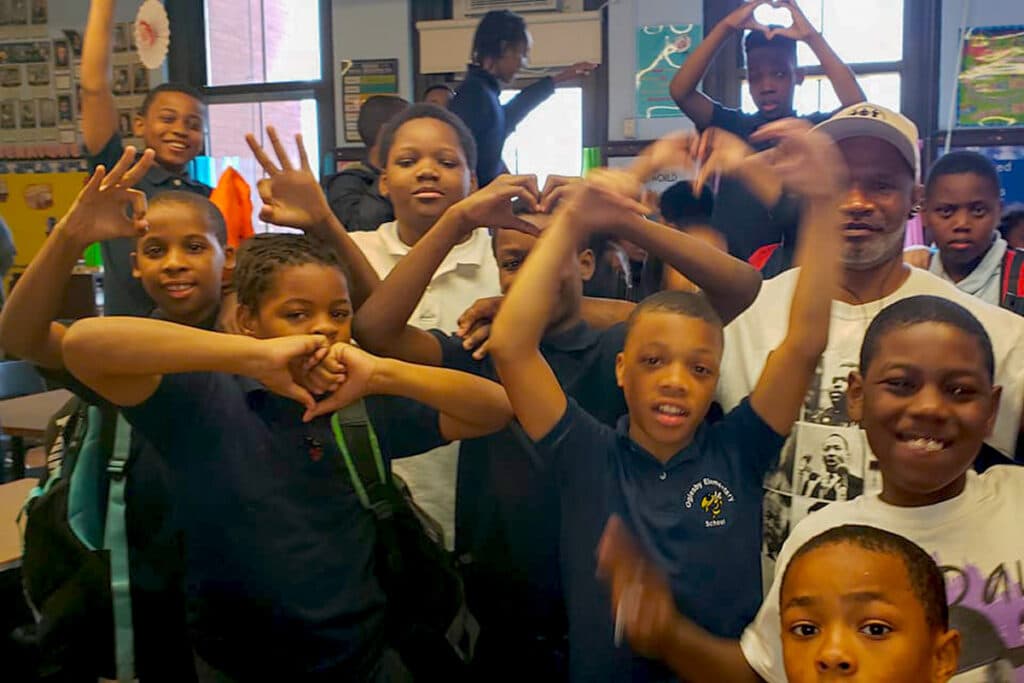
Raymond has been a strong advocate against the shootings of Tamir Rice, Mike Brown and Eric Garner. His advocacy work has been featured broadly on CNN and MSNBC media. Among other advocacy, he continues to lobby for a change of legislation affecting returning citizens, the term he advocates to be adapted for formerly incarcerated individuals, because the majority of them are now productive members of society like himself. To reiterate the puzzling question his mentor uses in advocacy, Raymond asks “Where do my wrong ends and my rights begin?"
Raymond calls on all Goldin Global Fellows to stay connected and united, because the struggle against violence is not only in America but worldwide. He would be happy to hear from any fellow interested in collaboration or needing any assistance that he can provide. He says “every one of us is better than any one of us” Brothers Stand Together needs us to keep them uplifted as they keep us uplifted.
Dear White Funders: I Can't Breathe Either
by Frank Latin, 2019 Chicago Peace Fellow
My name is Frank Latin and first and foremost I’m a black man. I am also the founding Executive Director of Westside Media Project, a small non-profit organization on Chicago’s West side that works to provide exposure to students (and now adults) in media/technology related fields.
I’ve been wanting to get this off my chest for a few years. Now, with the unfortunate murder of George Floyd and the ensuing worldwide protests, which have led to ongoing discussions around the topic of systemic racism, I feel this is the perfect time.
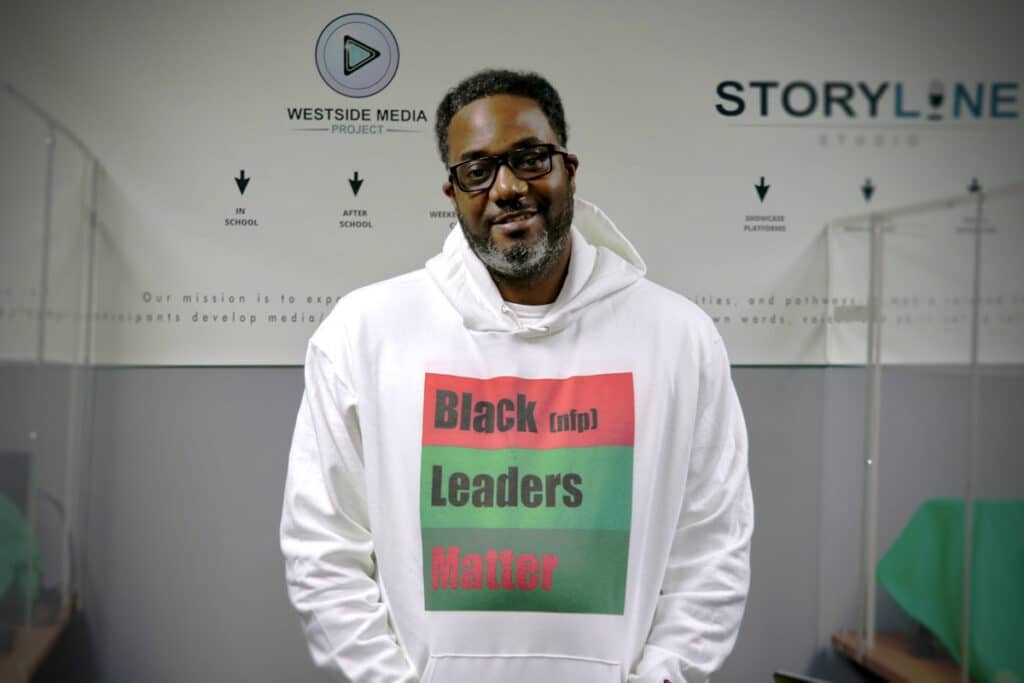
What I’ve learned in 14 years of running a non-profit is that philanthropy is one of the most racist sectors of society, competing neck and neck with the criminal justice, education and the health care systems in America. In fact, my view is that philanthropy works to bolster and prop up those other sectors by reinforcing the status quo. It is based on white society’s ‘Savior complex’ and supports white leaders at all costs, even those doing work in black and brown communities.
The perceptions I had of an uneven playing field used to upset me and have me somewhat disgruntled. However, I came to realize my perceptions were reality and have been substantiated in multiple studies, the latest published in December of 2019 by the Bridgespan Group, titled ‘Disparities in Funding for Leaders of Color Leave Impact on the Table.’
Philanthropy assumes that black and brown people living in distressed communities are part of the problem rather than part of the solution. I come to realize that as a professional, educated black man, I simply do not fit within the current model of philanthropy, primarily because I look like, walk like and talk like the residents on the west side of Chicago. The notion of a black man doing positive work in a black community without a white brain-trust or network to validate the organization is not enticing to funders. I lack what I term “white insurance” to make funders feel comfortable that their support is safe.
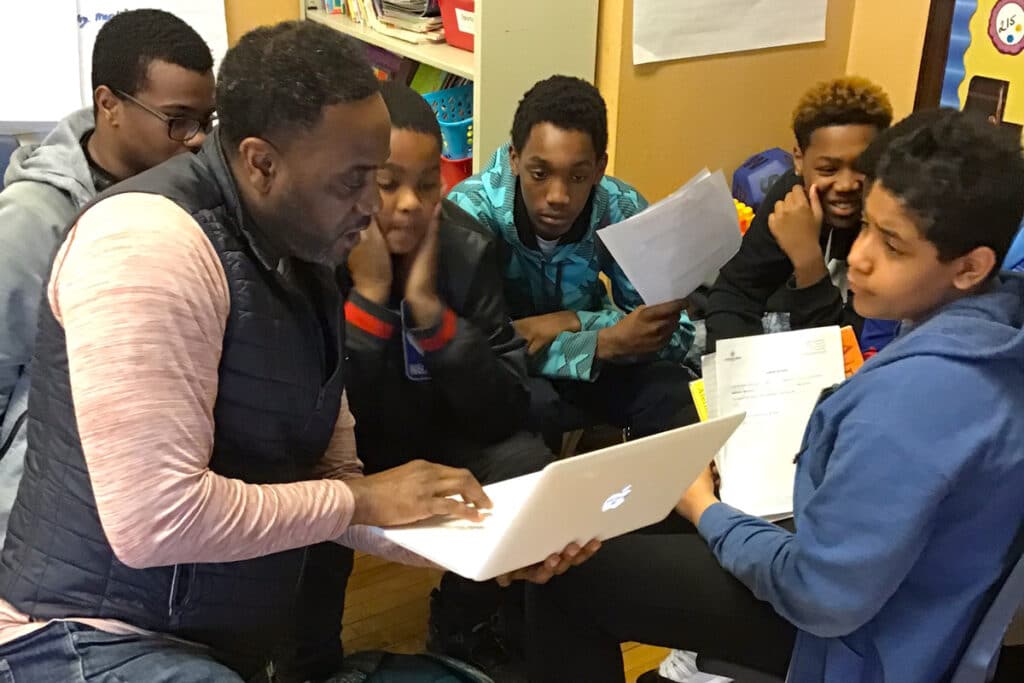
I’ll admit, when I started the organization back in 2006 I had little to no knowledge of how philanthropy worked. What I did have was a bachelor’s and a master’s degree in economics with years of experience working at a government agency so I was more than capable of learning the ropes. I decided to begin a volunteer project that eventually became something much bigger; but which I still do voluntarily.
Chicago is home to a vibrant philanthropic community and they support issues and causes not only here in the city but around the globe. However, here in the city they seldom support organizations led by leaders of color working to address those very issues, and in those instances when they do, it will rarely, if ever be at the same level shown for white led organizations doing similar work.
This has directly led to a tiered, apartheid-like structure within non-profits in Chicago where there is a huge gulf between white led organizations and those headed by leaders of color. It also perpetuates ‘culture vultures’ who seek advancement, profit and notoriety off both the misery of black and brown people as well as the structural racism that exist within philanthropy. It also encourages phony alliances in which whites who yield privilege and influence utilize people of color as fronts or tokens to gain inroads into certain communities.
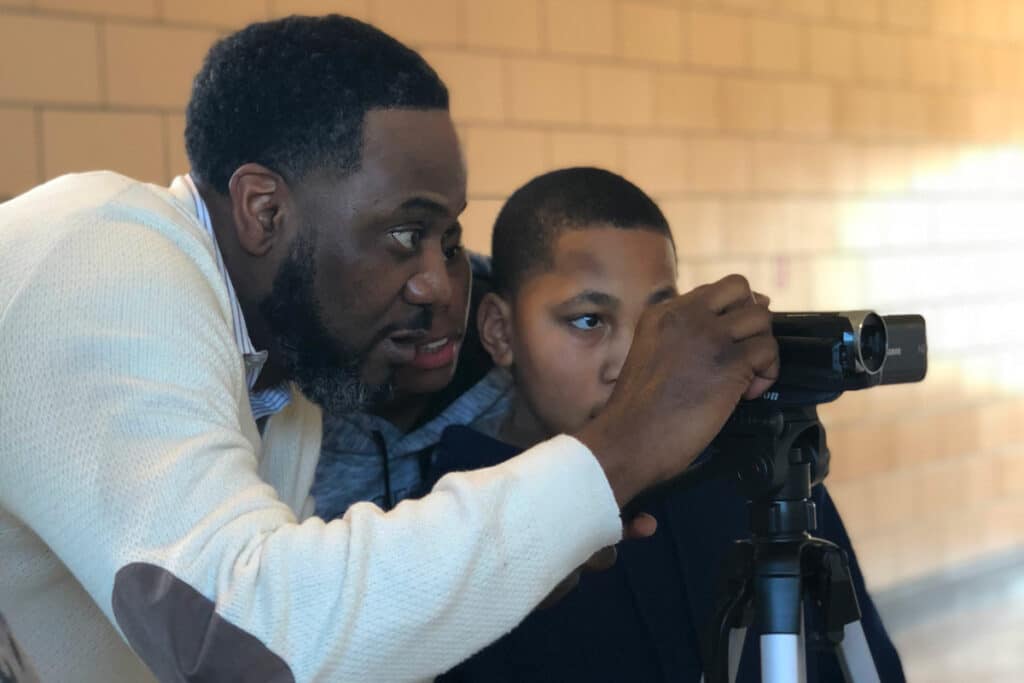
The Covid-19 pandemic has put a spotlight on the health disparities that have always existed in America. Police misconduct has been thrust back into the headlines again, and rightfully so.
Philanthropy on the other hand, is a sector that often goes unnoticed and its racist policies and practices never get splashed across the evening news or social media posts. However, the lack of funding provided to leaders of color added with the desire to prop up white leaders to do work in minority communities has devastating effects. At times, it works like a sniper, taking would-be leaders right out the field. Other times it provides a slow death, reminiscent of a choke hold or a knee to the neck not allowing organizations ran by leaders of color to service our communities.
To the philanthropic community of Chicago...I CAN’T BREATHE!!
Learn more about Chicago Peace Fellow Frank Latin's work at WestsideMediaProject.org.
Support the Mutual Aid Collaborative
Enough is Enough: Fellow Raymond Richard Calls for Peace After Senseless Murder
In the wake of the senseless murder of 9-year old Janari Ricks, Global Goldin Fellow Raymond Richard joined peace builders from across the city to host a call for an end to the violence that is on the rise in Chicago.

The Founder of Brothers Standing Together, Raymond is also a resident of the near north side community where the murder of Janari Ricks took place. The murder hit home for Raymond in a personal way, as Janari is part of his extended family.

This is my community. I came back home to help as many people as I can help and save as many lives as I can save. Unfortunately, his life wasn't saved. So that means we dropped the ball. The men dropped the ball.
In his impassioned plea for the murders to stop, Raymond continued:
But we are here to say today, "Enough is Enough" and it's over with. We will no longer stand by idle while our children are being slaughtered at an alarming rate.

After calling for the shooter to turn himself in, Raymond continued:
To the children: I pledge to do all I can do to make your lives safe, even if it means laying down my own life... We as a people must get involved to stop the bloodshed of our people. It doesn't matter the color. We're dying at an alarming rate and we must take a stand now.
Raymond Richard is an Alumnus of the inaugural class of Global Goldin Fellows in 2018, a cohort of 20 passionate grassroots leaders from 16 countries from Africa, Asia, Europe, the Middle East and North and South America.
Click here to read the watch the video on WGN9 News.
Peace is Blooming in Chicago
On Sunday, May 3rd the Chicago Peace Fellows launched the Peace Flowers campaign by delivering over 75 flower bouquets to mothers that have lost children to violence.

The Peace Flowers campaign is a collective response from the Chicago Peace Fellows Mutual Aid Collaborative comprised of 38 peace organizations throughout Chicago who are working togehter to address the twin epidemics of COVID-19 and violence in Chicago.
Violence is rising in Chicago in the same south and west side neighborhoods most impacted by COVID-19 where the Peace Fellows live and work. With funding for frontline peace-building organizations often diverted to respond to the coronavirus, the Mutual Aid Collaborative is building sustainable social impact models to raise funds and create jobs.

"Peace Flowers is an innovative and easy way to fund these organizations while also investing in sustainable job creation on the south and west side of Chicago where these lovely blooms are grown."
Quilen Blackwell, Chicago Peace Fellow, Chicago Eco House

Pamela Bosley, Co-founder of Purpose Over Pain, works with mothers to connect them with each other to build a community of support.
“Many of the moms have a hard time with Mother’s Day. With the pandemic, it’s been even harder. Many mothers are reporting problems with depression and other issues related to being disconnected.”
Pamela Bosley, Chicago Peace Fellow, Purpose Over Pain
Quilen Blackwell, Owner of Southside Blooms, a social enterprise that helps youth in Englewood find opportunities in urban farming. They work to build a sense of entrepreneurship to help youth see opportunity and way out of drug trade. Quilen saw an opportunity to support Pamela’s group by providing them with beautiful bouquets in honor of Mother’s Day and to help lift their spirits. “The flower market is in huge disruption right now. 80% of flowers are imported from overseas and due to the trade issues related to the corona virus, most flowers need to come from domestic sources.” Quilen noted.

AnnaMaria Leon, Co-owner of Homan Grown, saw a collaboration in the making. She noted how this idea can be more than just a single action but, can be a part of a broader strategy to support mothers and fund projects for the Chicago Peace Fellows. She contacted her friend, Pascal Sabino, a local reporter for Block Club Chicago who wrote a powerful article about the project. The story was also featured by ABC7 in this compelling feature.
Once the funding and logistics were done, the team came together to prepare and deliver the flowers. The flowers were delivered to families across Chicago and the surrounding suburbs. The deliveries added a personal touch because they were distributed by Southside Blooms, Annamaria, and myself as Director of the Chicago Peace Fellows.
"I personally got the witness the joy and gratitude of the moms who received bouquets. It was a very moving experience to hand out flowers and cards that reminded the moms “You are not forgotten.”
Burrell Poe, Director, Chicago Peace Fellows
The deliveries were bittersweet, acknowleging the loss of family members but also because the deliveries were contact-less. No handshakes, no hugs, and at least 6ft of physical distance. Masks, gloves and hand sanitizer made this gesture different that it would have been prior to COVID-19. However, it made it all the more important because, people are suffering on top of the suffering that has already befallen their lives.
"Wonderful. Wonderful, it really made my day," said Elizabeth Bolden, a mother who received the bouquet.
The project has thus far raised over $5000 on GoFundMe and is entering into the next phase of it's social impact model where the public can purchase a subscription for flower delivery that also funds violence prevention work through the Chicago Peace Fellows Mutual Aid Collaborative.

Project oragnizers at Southside Blooms and Homan Grown will hire local youth to grow and arrange the flowers and donate a percent of their sales through the Peace Flowers campaign to support this network grassroots peace organizations on the West and South sides of Chicago plagued by the twin epidemics of violence and COVID-19.
"The goal is to create a long term sustainable funding stream for peace organizations in Chicago so that these groups have greater freedom at doing what they do best: making Chicago a more peaceful and beautiful place to live!"
Learn more about the Peace Flowers program at SouthSide Blooms
Peace Fellows Meet With Metropolitan Family Services

On Wednesday, April 8th, the Chicago Peace Fellows hosted a conversation with Metropolitan Family Services (MFS) to learn about their efforts to reduce the amount of gun violence in the city. MFS talked about three of their specific projects: Communities Partnering for Peace (CP4P), The Metropolitan Peace Academy, and Lights in the Night.
The Chicago Peace Fellows learned about the work of these interrelated projects to reduce violence, heard directly from program directors about their experiences, and explored how they can best be involved.
Communities Partnering for Peace, the Metropolitan Peace Academy, and Lights in the night are strategies meant to support community-based organizations provide on the ground services in communities across Chicago. Domonique Mccord, Director of Community Behavioral Initiatives, explained that the role of MFS in CP4P is to bring smaller community-based organizations together and provide professional services such as accounting, human resources and mental health services that would be difficult for street outreach organizations. MFS provides these services to organizations across the city.

The Chicago Peace Fellows also learned about the Metropolitan Peace Academy which seeks to professionalize street outreach and create a learning institution to share best practices across organizations. Vanessa Dereef, Director of the Metropolitan Peace Academy, shared that it is important for outreach workers to build relationships to support one another across the city. Several Chicago Peace Fellows were familiar with the Lights in the Night program which runs programs at night in public places over the summer. Several Fellows have participated in these activities and learned more about how they can be involved.

The Chicago Peace Fellows were really interested in how they can support the activities of MFS and be involved as community leaders in street outreach. Steve Perkins, Director of Outreach, explained that they can learn more about the street outreach organizations in their neighborhoods and share information when it’s appropriate. He encouraged fellows to participate in community activities and to get to know the people in their neighborhoods.
A Night to Remember!
By Frank Latin, Senior Advisor, Communications
For me, the Goldin Institute’s 2019 Chicago Peace Fellows graduation ceremony was an inspiring event. The ceremony marked the completion of a six-month fellowship in which myself and 18 other committed community leaders collaborated to complete an engaging, community-focused curriculum and attend other scheduled workshops. The Chicago Peace Fellow program, with the use of its GATHER platform, is designed to share new social change tools and concepts that can assist in creating safer and more peaceful communities with individuals who already working in high-need areas on the South and West sides of Chicago.

The event attracted close to 100 people, including family, friends, colleagues and civic leaders who showed up to acknowledge the collective work of the CPF graduates. The group is comprised of individuals who lead small organizations and do not allow our even smaller budgets to deter us from doing the work that our communities so desperately need.

Our budgets and our organizations are small, but our work has a huge impact in the communities we serve.
To be honest, it was a pleasant surprise to see so many people come out to honor the work of a small group of people whose work often goes unnoticed by the mainstream. The evening came full circle for me when I ran into an old colleague at the event, Susana Vasquez, who I hadn’t seen in a while. Susana volunteered to conduct our first strategic planning session over 12 years ago. The mission and vision we crafted back then has helped guide me to this point...And here we are, the Westside Media Project is now in its 14th year of engaging and empowering community residents to utilize digital media to tell their own stories.

In the end, the ceremony not only celebrated the work of the 2019 Chicago Peace Fellows, it also highlighted one of the core beliefs at the Goldin Institute that is not universally shared throughout the philanthropic community: Leaders of color who live in the communities in which they serve are more than capable of providing solutions to problems that exist in their communities.
The Goldin Institute thanks the Conant Family Foundation, the Polk Bros. Foundation, Chase Bank, the Partnership for Safe and Peaceful Communities and our generous network of champions for community driven social change for supporting the Chicago Peace Fellows
